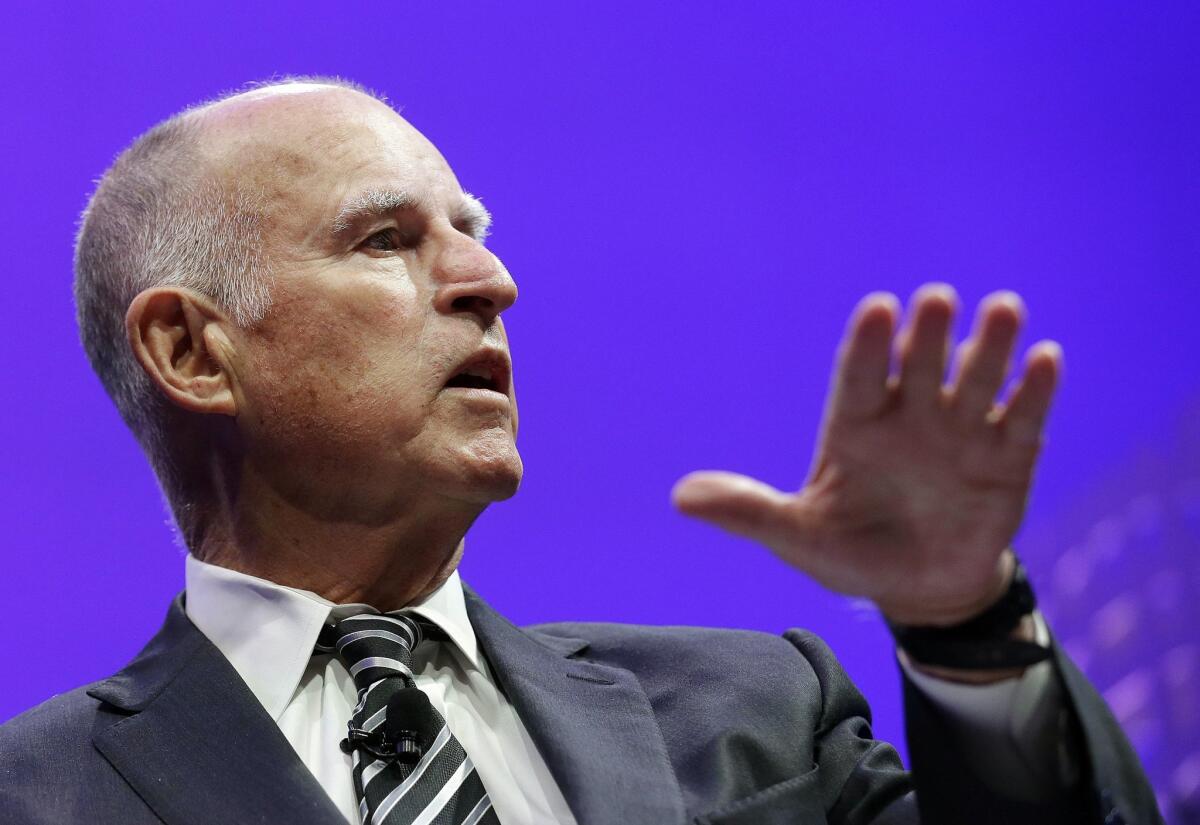Capitol Journal: Governors’ tough talk can’t block refugees

On the refugee issue, Gov. Jerry Brown said he would “work closely” with President Obama “so that he can both uphold America’s traditional role as a place of asylum, but also ensure that anyone seeking refuge in America is fully vetted.”
Reporting from Sacramento — Half the state governors in America are constitutionally ignorant or shamefully demagogic. Most likely it’s the latter, but some may be both.
This depressing reality came to light last week when roughly 30 governors — all Republican except one — proclaimed they’d refuse to accept Syrian refugees into their states. One terrorist in the Paris attacks had carried a Syrian passport, probably fake.
To quote Clint Eastwood’s Dirty Harry: “A man’s got to know his limitations.”
Governors cannot bar anyone from their states. The U.S. Constitution gives all power over immigration to the federal government. Surely governors know that. And if so, the only explanation for their paper tiger pronouncements is that they were pathetically pandering to voters.
“I’ve gotten past the point of being astounded by grandstanding,” constitutional scholar Laurence H. Tribe told me. “I’m sure they know better. But by their calculations, they have nothing to lose by joining a bandwagon that can’t move.
“It’s not something a governor who cares about the law would do in great conscience, but I wonder how many governors really give a damn.”
I asked Tribe, a Harvard constitutional law professor who has argued scores of cases before the U.S. Supreme Court, whether governors have any control over immigration. “None,” he replied. “Absolutely none. Federal law is supreme.”
Once in this country legally, people can travel wherever they want.
During the Great Depression, California tried to keep out “Okies” fleeing the Dust Bowl and seeking work.
The Los Angeles police chief sent 136 cops to entry points along the border for a “Bum Blockade” to turn away down-and-out migrants. The Legislature also passed a bill making it a misdemeanor to bring an indigent into the state if the “pauper” had no means of support. That was ruled unconstitutional.
Tribe predicted, however, that the governors’ showboating “will register on the political seismograph in Washington.” And sure enough after he said that, the U.S. House overwhelmingly passed legislation that would effectively halt President Obama’s modest resettlement program for war-ravaged Syrians.
A softer take on the governors was offered by Sacramento-based political consultant Ray McNally, who mostly advises moderate Republicans. He gives the governors a pass.
“They’re hearing from people in their states,” McNally told me. “It’s the same reason 47 Democrats voted with House Republicans.
“This is really a powerful, emotional issue. People are watching the news cycles, seeing people being shot and blown up. The whole world is going crazy. They’re saying if there’s any chance someone is going to slip through and do harm, let’s take a deep breath and get it right.”
“It’s not an hysterical thing, not an anti-immigrant thing,” McNally continued. “It’s not hardhearted. It doesn’t mean slam the door shut. It just means don’t open it quite as wide and quite as fast.”
The governors, he added, are telling themselves: “Maybe I can’t stop [refugees] from coming in, but I certainly can go on record showing my concern for people in my state.”
In my dictionary, that’s a definition of grandstanding.
Gov. Jerry Brown played it cool, showing concern both for the refugees and public safety.
In a statement, Brown said he would “work closely” with Obama “so that he can both uphold America’s traditional role as a place of asylum, but also ensure that anyone seeking refuge in America is fully vetted.”
But Brown has his own checkered history of demagoguery about refugees. As a rookie governor when Saigon fell in 1975 and the U.S. was flying Vietnamese refugees to America, Brown was outspokenly opposed.
“There is something a little strange about saying, ‘Let’s bring in 500,000 more people’ when we can’t take care of the 1 million [Californians] out of work,” he asserted. His administration tried to block refugee flights to Travis Air Force Base near San Francisco.
The next year, Brown ran for president.
That was the old, young Jerry.
After the Paris massacres, Brown seemed to overstate what he was doing.
He apparently wasn’t working “closely” with the president because the White House, Bloomberg reported, refused his request for information about where the Syrian refugees were being resettled and for classified info collected in their vetting. “It’s a work in progress,” Brown top aide Nancy McFadden told The Times.
Brown announced that he was “fully activating” what’s called the California State Threat Assessment System, which is never really inactive. It’s a collaborative system between state, local and federal agencies that share information about suspicious characters and activities. But it doesn’t vet refugees.
Should Syrian refugees be banned from America? That’s a proper discussion and a different one than whether politicians should pander.
But there are many ways to sneak into this country, as we’ve learned. Maybe even forge a French passport.
Many of these Syrian refugees, like most immigrants, are the types we need to keep America vibrant. They’re energetic souls willing to get off their duffs and struggle for thousands of miles to pursue a better life. They freshen the melting pot.
Before hauling down the welcome sign, we should do a better job disarming our own home-grown terrorists by tightening national gun control.
That’s another topic, but there’s a similarity. Both incite demagoguery.
Twitter: @LATimesSkelton
More to Read
Sign up for Essential California
The most important California stories and recommendations in your inbox every morning.
You may occasionally receive promotional content from the Los Angeles Times.











